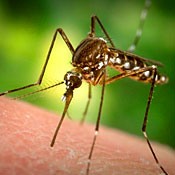|
||||||||||||||||||||||||

West Nile Virus Summer 2012Summertime is mosquito season, so it also is West Nile Virus (WNV) season. The Centers for Disease Control and Prevention (CDC) reports that nationwide WNV is spreading faster than it has in years past, partly due to a mild winter and several spring rains that allowed the mosquito population to build early. As of September 11, 2012, WNV disease has been reported in nine (9) Virginians: four in the northwest region, two in the northern region, two in the central region, and one in the southwest region. There has been one death in an older adult residing in the northwest region. These numbers are not unusual in Virginia: there were 9 reports of WNV disease in humans last year; for 2006 to 2010, WNV disease was reported in 1 to 5 persons annually. There was one death in 2011 and one death in 2010; from 2006 to 2009, there were no deaths. The easiest and best way to avoid WNV is to prevent mosquito bites.
For more information on West Nile Virus or other arboviral illnesses, please visit our West Nile Virus webpage or visit CDC’s website at http://www.cdc.gov/ncidod/dvbid/westnile/index.htm. |
||||||||||||||||||||||||
Multistate Listeria Outbreak Linked to Imported Cheese As part of a multistate Listeria monocytogenes outbreak, the Virginia Department of Health is collaborating with other state health departments, the CDC and FDA. As of September 11, 2012, 14 people were identified as part of the outbreak, including one case-patient from Virginia. Investigations done by officials in local, state, and federal public health, agriculture, and regulatory agencies indicate that imported Frescolina brand ricotta salata cheese distributed by Forever Cheese, Inc. is the likely source of this outbreak of listeriosis. Additional information regarding the outbreak investigation may be found on the FDA website at http://www.fda.gov/Safety/Recalls/ucm318844.htm and the CDC website at http://www.cdc.gov/listeria/outbreaks/cheese-09-12/index.html. |
||||||||||||||||||||||||

Algal BloomsAlgae are naturally-occurring microscopic organisms found in fresh and salt waters of Virginia and around the world. During hot summer months it is not uncommon for algae to multiply rapidly creating what is called an algal bloom. Algal blooms often result in a noticeable change in the color of the water. They can be many colors, but are most commonly red or brown and are referred to as “red” or “brown” tides. An odor may also be present in the vicinity of the bloom. Most algal blooms are not harmful, but some do affect humans, fish, birds, and marine mammals. more>> |
||||||||||||||||||||||||
 Are you, or
someone you know, having problems affording the medicines prescribed by your doctor?
Many companies that make commonly prescribed medicines have Prescription Assistance
Programs, through which qualifying patients (or their doctors) receive medicines
at low or no cost. For more information visit the Prescription Assistance Programs Web site or call our hotline
at 1-866-531-3065. Are you, or
someone you know, having problems affording the medicines prescribed by your doctor?
Many companies that make commonly prescribed medicines have Prescription Assistance
Programs, through which qualifying patients (or their doctors) receive medicines
at low or no cost. For more information visit the Prescription Assistance Programs Web site or call our hotline
at 1-866-531-3065. |
||||||||||||||||||||||||
| Change to Executive Order 85 - Virginia Workforce Network for Jobs Use of the Virginia Workforce Network for Jobs Resulting from the American Recovery and Reinvestment Act of 2009 and Those Being Recruited by Virginia State Agencies. It directs all state agencies, contractors and sub-recipients to use the Virginia Workforce Connection (VWC) for the recruitment of direct jobs created by the American Recovery and Reinvestment Act (ARRA) and for jobs in all state agencies, regardless of funding source. To read the Executive Order please click here. |
||||||||||||||||||||||||
| Virginia Health Information 'Virginia Health Information' is a resource for patients and consumers looking to learn about and compare options on everything from obstetrical services, to heart care, to pricing information on commonly performed medical procedures. Virginians can use VHI information to make informed health care purchasing decisions and as the basis for an informed conversation with their health care providers. Learn more>> |
||||||||||||||||||||||||